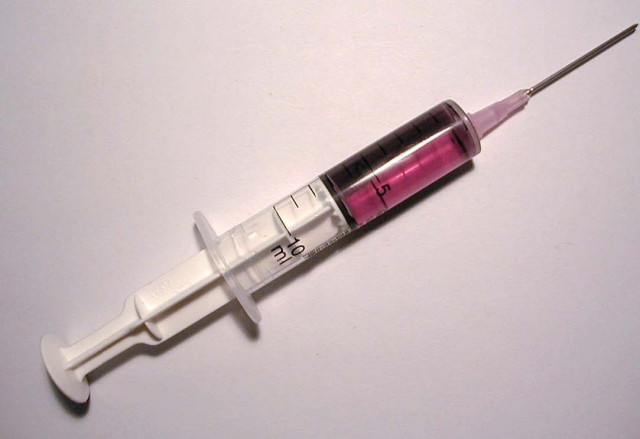Two accused of manufacturing adulterated injection held
12 inspectors suspended after investigation finds drug packaged in unhygienic environment

Dozens of diabetes patients in Pakistan suffered vision loss after being given a contaminated drug, a provincial health official said Tuesday.
Two men behind the supply of the drug, Avastin, have been arrested and 12 government inspectors suspended after an investigation found the medicine was packaged in an unhygienic environment, according to police and health authorities.
"As of now, the injection has severely affected the vision of 68 patients in Punjab," said a spokesperson for the province's health department, who declined to be named.
At least 12 people have reported complete blindness.
"We will only be able to assess the true extent of harm done by the injection once the infections are completely treated," the spokesperon added.
Supplied by the Swiss pharmaceutical company Roche, Avastin is primarily prescribed for the treatment of cancer, however it is given off-label in Pakistan to diabetic patients to block the growth of abnormal vessels in the eye.
It comes in doses of 100mg, but it is divided and repackaged locally into smaller doses as a low-cost option to treat certain eye conditions.
Karsten Kleine, a spokeswoman for Roche in Switzerland, told AFP that the drug is not approved for any use in the eye.
"Roche strongly condemns this criminal act of counterfeiting and is doing everything in its power to cooperate with the authorities to protect patients from counterfeits," Kleine said in a statement.
The provincial health ministry has now banned the use of the drug for eye treatment.
One in four adults in Pakistan have diabetes – one of the highest rates in the world – blamed on a lack of excercise and high sugar diet.
Meanwhile, Punjab interim Health Minister Dr Javed Akram maintained that Avastin was administered without informed consent.
There were reports that more cases were surfacing across the province and the health authorities were assessing them to make them a part of the government data.
Addressing a news conference in Lahore, Dr Akram said the injection was ordinarily used in the treatment of cancer patients and its use in ocular procedures was not approved by the US Food and Drug Administration, Drug Regulatory Authority of Pakistan (Drap), Indian medical authorities or the drug manufacturer Roche itself.
He said the drug’s administration was an “off-label use” of the medicine, adding that it was mandatory for such use to be permitted by Drap.
The minister observed that nothing of the sort happened in the recent matter and consent was also not taken from patients.
Adding that the drug was banned until further notice for eye administration, Dr Akram stated: “We decided today that whenever, if, we will allow [the usage], we will give awareness to the patient, they will be fully protected and told [about the risks] and written informed consent will not be enough, we will need a recording that it the benefits and risks have been explained to the patient.
“And then if the patient agrees, then it will be used.”
The minister said there would be “zero tolerance” shown to the culprits and they would be brought to justice.



















COMMENTS
Comments are moderated and generally will be posted if they are on-topic and not abusive.
For more information, please see our Comments FAQ